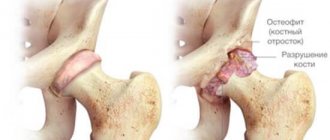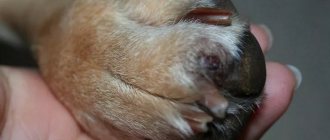Heart problems affect not only humans, but also their pets. Moreover, in many cases, signs of illness appear only when nothing significant can be done to help the animal. Therefore, it is important for owners to be aware of not entirely typical clinical signs, which, nevertheless, may indicate serious problems with the animal’s health. Here, for example, is a cardiac cough in dogs.
A dog's heart cough is a symptom of serious problems.
Symptoms of heart cough in dogs, causes of the problem and how to treat it.
As you know, coughing is a natural physiological reaction of the animal’s body to certain irritants, and therefore every owner has heard his dog coughing more than once. In most cases, the cause of cough is either infections of varying complexity, or direct entry into the windpipe of some foreign objects or liquids. Of course, a cough can also be caused by injuries, allergies, parasites and other diseases, but few people know that even cardiovascular diseases can cause similar symptoms.
The so-called cardiac cough in dogs is not very common, but if you pay attention to it in a timely manner and promptly take the animal to an experienced veterinarian, you can cure your pet and perhaps even save his life.
Tips for dog breeders
The dog should not be fed for the first hours after an attack, but water should be given as much as the animal wants. It is important to remember that after visiting the veterinarian, your pet may experience discomfort and be scared, so its behavior will not be the same as usual. For the first 48-72 hours, you need to observe the dog’s behavior: if any alarming factors appear, visit the specialist again.
During an attack, the dog’s limbs do not bend, the mouth is open, and attacks of suffocation and panic attacks may occur.
We recommend reading: What color is the afterbirth of a newborn puppy?
After an attack, examinations by a specialist should become regular: at least once every three months. It is important to strictly follow the specialist’s recommendations and give all medications in a timely manner. If an animal has hypothyroidism, obesity or diabetes, it must take a certain set of special medications throughout its life. Some clinics in Europe practice implantation of pacemakers, but the cost of this treatment method is too high.
It is important to know that you can reduce the risk of an attack by eating the right foods that contain the necessary elements. To choose the right diet, you need to consult a veterinarian. Calcium and phosphorus should be present in equal amounts in the food of a sick dog, as this is extremely important for the proper functioning of the heart.
We recommend watching the video to see what a myocardial infarction looks like in a dog.
Heart attack is one of the five most common illnesses among people. But our four-legged friends are not immune from it, and every year the number of animals with this pathology is steadily increasing. And although the disease that occurs in dogs is less studied than the human disease, experts have still managed to figure out the mechanisms of its development and offer suitable diagnostics and therapy. If a pet is prone to developing this disease, then the owner should know how a heart attack manifests itself in dogs and what to do in this case.
Causes of cough in heart disease.
Cardiac cough in a dog, treatment of which is possible only after identifying and eliminating the cause. It is important to note that cough is often one of the first symptoms of many heart diseases, since most diseases begin with damage to the mitral valve. At the same time, fluid gradually accumulates in the lungs, and the heart muscle increases in size and compresses the trochea, blocking the free access of oxygen and provoking a severe cough. Typically, problems of this kind occur in adults and large animals, and are accompanied by a hearty cough and noticeable bluish gums.
Another cardiovascular disease that does not affect the mitral valve, but causes coughing, is dilated cardiomyopathy. Typically, this disease occurs in large and adult overweight dogs and develops very rapidly, causing bouts of severe coughing. It is also characterized by the appearance of arrhythmia.
Fighting heart cough
In older dogs, a common cause of gurgling and persistent coughing is heart problems. If blood does not circulate normally in the pulmonary circulation, pulmonary edema is possible, accompanied by exudate.
To reduce the likelihood of such pathologies and make it easier for your pet to breathe, he is prescribed medications that prevent the development of swelling. And most often these are banal diuretics (medicines that increase urination):
- Torsemide. Dose – from 0.5 to 1 mg per kilogram of dog weight. In addition, Furosemide, which is a complete analogue of this medicine, can be used for the same purposes.
- Hydrochlorothiazide. Dose – from 1 to 2 mg per kilogram of weight.
Important! All diuretics promote accelerated excretion of potassium from the body. This must be compensated for by prescribing multivitamin formulations and nutritional supplements. Otherwise, heart problems may only get worse.
Methods for determining the disease and its treatment.
Cardiac cough in dogs and other symptoms of cardiovascular diseases are not very noticeable and may not be immediately noticeable, but they cannot be ignored, because the life of your pet will directly depend on the promptness of your actions.
To begin with, you should decide that you cannot diagnose heart disease on your own. Even an experienced specialist will need to carry out several procedures for these purposes, including X-ray or ultrasonographic examination.
A dog's cough with heart failure is very sharp and severe, and often repeated. It is significantly different from the cough of a common cold, so if your dog has ever been sick, you will definitely pay attention to this symptom. If you notice something similar, and in addition to this, you also see other oddities in the animal’s behavior, such as obvious weakness, bad mood, anxiety or refusal to eat, do not hesitate and visit a specialist.
Depending on the disease itself and the degree of its development, the doctor will prescribe treatment - from medication to surgery. In any case, while you are solving health problems, you will need to provide your dog with rest and a suitable diet.
Whenever there is a cough, some owners rush to feed the animal with special tablets, available at every veterinary pharmacy. These medications are not harmful to the animal and may even relieve the cough itself, but they will not definitely eliminate its cause and may even cause your delay. Self-medication can be an excellent solution only if you know exactly the causes of the cough.
Source: animal-doc.ru
How to identify cough in cardiac diseases
The veterinarian usually begins with a complete examination of the animal, including listening to the heart and lungs with a stethoscope. He will also need to hear your pet's cough. To do this, the doctor gently compresses the trachea. A healthy animal coughs 1-2 times, while a sick animal coughs for several seconds and only then stops.
Did you know? A wet nose helps your dog detect odors due to the special chemical composition of this wet liquid.
Depending on the results of this initial examination, the doctor may recommend additional tests, such as:
- chest x-ray;
- electrocardiogram;
- echocardiogram, etc.
And if they are, then find out how big the problem is. You can help the doctor diagnose if you describe the main symptoms: when your pet coughs and how exactly it happens.
Causes of cough in dogs
Coughing is a reflex contraction of the muscles of the respiratory tract due to irritation of receptors. The cough can be dry or wet, infrequent or frequent, paroxysmal, acute or chronic.
The causes of cough in dogs can vary. Conventionally, they can be divided into several groups and subgroups:
Contagious
a) Respiratory tract infections (they can be of viral, bacterial, fungal origin - for example: infectious viral tracheitis, bronchitis, bronchopneumonia, etc.) - usually these infections occur acutely or subacutely. Dogs become infected through airborne droplets through close contact with sick animals or in crowded housing. Infection is facilitated by hypothermia, stress, and weakened immunity. With adenovirus, it is often called kennel or aviary cough; a dry, painful, unproductive cough often occurs, often leading to vomiting.
The owners describe it as follows: “the dog is trying to cough up something, as if he was choking, coughing until he vomits.” This is a clear clinical symptom of infectious tracheobronchitis, which can be caused either by a single infectious agent or by an association of viruses, bacteria and protozoa. Bronchitis or tracheobronchitis, which began as a viral infection, can be complicated by a bacterial infection, and the nature of the cough also changes - at first it is dry, there may be stridor “wheezing”, after a few days the cough becomes wet, with the appearance of sputum and shortness of breath.
b) Parasitic diseases , which include invasion by endoparasites - nematodes (subacute, chronic process). The most dangerous among them are heartworms. They parasitize in the pulmonary artery, and can be localized in the subcutaneous tissue and in the organs of vision. Dogs become infected when bitten by an infected mosquito. The life cycle of these parasites is associated with the migration of ingested larvae from the gastrointestinal tract into the lung tissue.
The helminths spend about 2 weeks in the respiratory organs, and then they expectorate, are swallowed again along with sputum, and grow into adults in the intestines. It may take several months for the dog's body to mature into adults and begin to reproduce. Therefore, dog owners may not immediately notice the disease.
Cardiac cough in dogs: what is it?
Cough, regardless of its etiology, is a protective reflex that occurs in the body as a reaction to irritation of specific cough zones of the trachea and bronchi.
Not in all cases, cough is a symptom of a respiratory disease. Its appearance can be provoked by an internal cause - that is, diseases of the organs bordering the respiratory system. Thus, a characteristic symptom of cardiac diseases is a characteristic cardiac cough in dogs.
For what reasons can it develop in an animal?
There are many reasons why cardiac pathology develops. These can be either congenital or acquired features.
The most common factors:
- Breed predisposition.
- Congenital defects are defects in the anatomical structure of the heart and valve apparatus.
- Parasitosis – dirofilariasis (the disease is caused by helminths that live in the vessels of the lungs and the right side of the heart).
- Disorders of the thyroid gland.
- Neoplasms.
- Mechanical damage (injury).
- Age. Congenital defects are most often detected before one year of age. In older dogs, changes can be associated with various changes in the body, often as a secondary disease.
- Previous viral infections (often parvovirus).
- Bacterial diseases (pyometra, urinary tract infections, prostatitis and others).
- Chronic diseases of the respiratory system (pneumonia).
It should be noted that heart attacks are extremely rare in animals. Therefore, it is not considered a possible cause of heart failure.
Causes of cardiac cough
A cardiac cough in a dog is a symptom of heart pathology, most often heart failure. With this and some other diseases, the heart increases in size and compresses the trachea. Cough receptors located on the trachea send a signal to the dog’s brain, and the animal coughs, despite the fact that it has no real need to clear the respiratory system of mucus and foreign bodies.
A harbinger of the appearance of a cardiac cough in a dog is most often shortness of breath that occurs during physical exertion. Animals over six years of age and dogs of large fighting breeds are most susceptible to pathological changes in the heart and the resulting cough. Treatment of cardiac cough in dogs is aimed at stopping or alleviating the manifestation of this symptom and, as a rule, is difficult due to its chronic nature.
Disease Prevention
If you have taken the liberty of getting a dog, then try not to forget about it. And always remember that a dog requires constant attention. Values his owner. That the animal is always grateful to him simply for having an owner. This pet needs your constant love and care. To avoid such diseases it is necessary:
- explore your dog's physical abilities. Select and regulate her physical activity. To do this correctly, you must take into account the breed of your dog. After all, the physical capabilities of each animal are different.
- It is vital for a dog to exercise a lot. Constant movement is normal for her.
- You should not keep your pet on a leash all the time. And it’s also not worth keeping it within four walls in an apartment. Garden, field, square, forest - animals need space.
- You need to take your dog for a walk several times a day. Walks should be enjoyable, not tiring, for your four-legged friend.
- You can’t limit yourself to just one long walk a day.
- When talking about your pet’s nutrition, you need to take into account its age, breed, and personality traits.
- Make sure your diet is balanced. Your dog's diet must contain proteins, fats, and carbohydrates. But at the same time, there should always be a place for minerals and vitamins in an animal’s diet.
- When preparing the next portion of food each time, you must constantly keep track of the amount of salt that gets into your pet’s food. And also monitor how much fat your dog gets with each meal.
Starting from the age of six, all dogs become candidates for the so-called “risk group”. It is from this age that there is an increase in heart failure among dogs. Owners of four-legged friends need to know this:
- Dwarf dogs must be regularly examined by a specialist. Since they are very prone to heart diseases, especially heart failure.
- If your dog's nervous system is easily excitable, then he needs to visit the veterinarian quite often to know about the condition of his heart.
- Large dogs are also predisposed to heart failure. Owners of such dogs should remember this well.
- There are several dog breeds that are predisposed to cardiovascular disease.
The sooner heart failure is detected in an animal, the more effective the treatment becomes. After all, it is well known that a disease at an earlier stage is much easier to treat.
How to recognize a heart cough in a dog
Any kind of cough is an alarming symptom and requires consultation with a specialist. However, even before contacting a veterinary clinic, certain assumptions can be made regarding the etiology of the cough. A cardiac cough in a dog is characterized by:
dull, “uterine” sound;
a gradual increase in intensity as the heart disease progresses;
lack of discharge (sputum) or bloody discharge (in advanced cases);
attacks that are painful for the animal, in which it seems as if the dog is choking and cannot clear its throat.
Treatment of cardiac cough in dogs
It is important to begin treatment of cardiac cough on time, since this symptom only aggravates the course of the underlying disease and provokes further development of the pathology. This type of cough is treated with specific therapy aimed at relieving the symptom or reducing the intensity of its manifestation.
Complex treatment of heart failure and accompanying cough is carried out with the help of drugs (riboxin, corvaldin, kratal, antitussive children's mixtures), vitamin therapy, diet and dosing of physical activity. A qualified specialist must select treatment for your dog.
Source: kotopes.ru
Diagnosis and causes
The cough can be dry or wet; It is worth paying attention to productivity and duration, time of occurrence (sleep, physical activity), and the age of the pet. Are there other symptoms associated with it:
- weakness;
- sleep disturbance;
- temperature increase;
- refusal to eat;
- aggression;
- vomit;
- weight loss;
- mouth ulcers or bleeding;
- enlarged lymph nodes.
Important! If your pet coughs for a long time, additional symptoms appear - contact a specialist as soon as possible.
The causes of cough are usually:
- inflammatory processes of the respiratory system;
- throat diseases;
- tracheobronchitis;
- foreign objects caught in the respiratory tract;
- oral infections and dental diseases;
- heart diseases;
- tumor diseases of the lungs;
- parasite infection;
- allergic reaction;
- tracheal collapse.
Attention! Coughing is a physiological characteristic of brachycephalic (short-skull) breeds.
A dog has a cough, as if choking: treatment, characteristic symptoms
The course of treatment is prescribed by a veterinarian based on the causes of the cough. If the diagnosis is made, then traditional treatment methods are used. They are listed below.
Kennel cough
Another name is aviary. This is viral tracheobronchitis - an infection that affects the pulmonary system. Causes a strong dry cough, sometimes gagging, and is often confused with a foreign body getting stuck. Kennel cough in dogs: symptoms and treatment will be discussed below.










